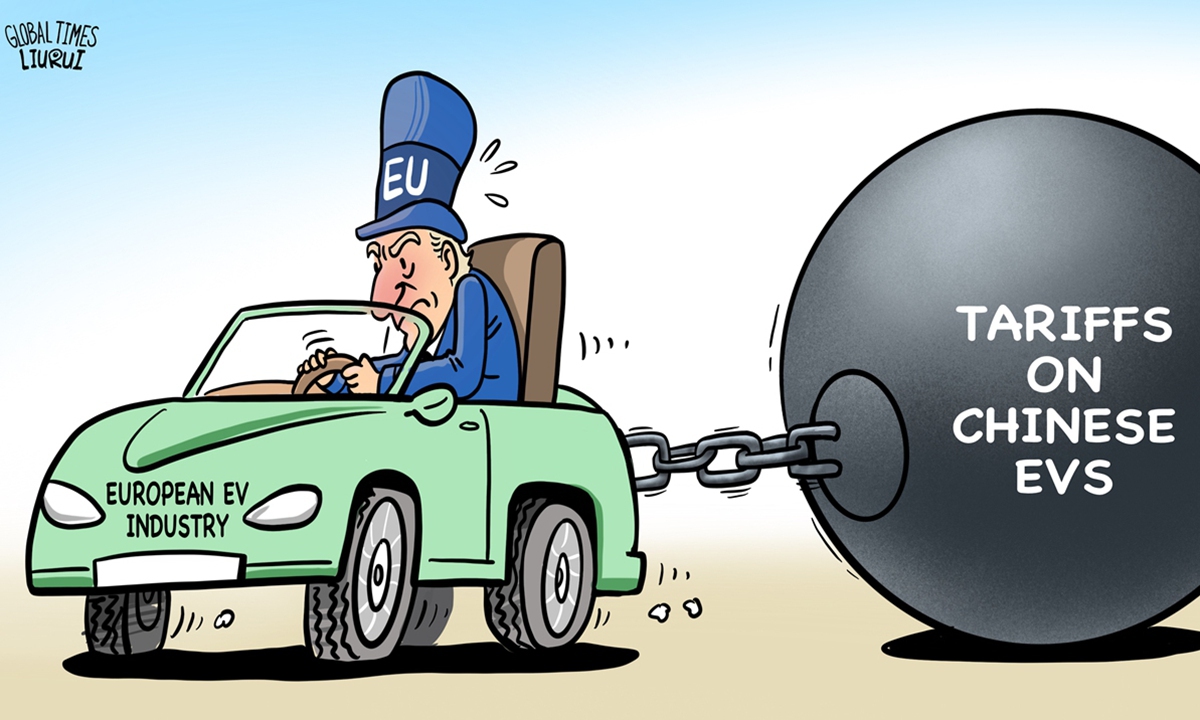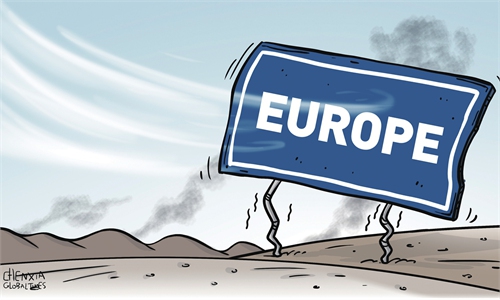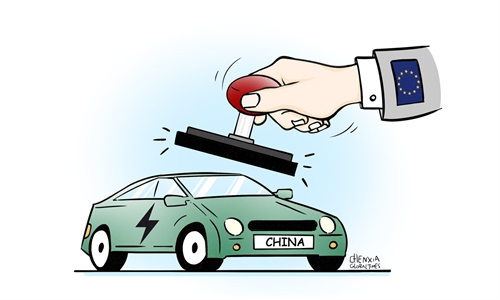
Illustration: Liu Rui/GT
The European Commission's decision to raise tariffs on Chinese electric vehicles (EVs) is now official. This hardly comes as a surprise. Rounds of difficult negotiations between China and the EU failed to avert the protectionist trade measure.A review of the whole process leading to the current situation triggers strong debate. At least six questions should be asked on the legitimacy of the tariff decision.
Why does the Commission launch an anti-subsidy investigation unasked by the European EV industry?
A probe like this is usually launched in response to the appeal from the affected industry. It is so curious a case that the Commission says it is to protect the interests of European businesses, who are not making complaints. In fact, on the contrary, European auto companies are among the most vocal protesters against the tariff plan. They are fully aware of the role of competition in enabling technological advances and fully confident about their ability to compete. Then, whose interests is the Commission protecting?
Why does the Commission adopt a tariff decision without support from the majority of EU member states?
For both rounds of voting, the EU member states that did not support the proposal outnumbered those supporting it. The EU is clearly divided on the matter, with more countries not seeing tariffs as a good idea. Member states understand that protectionism will not make the European auto industry more competitive, but only shut the door to cooperation. Doesn't the Commission need to listen to the views of the member states?
Why does the Commission want to hurt the interests of European consumers by making things more expensive for them?
According to a survey by the German Automobile Club, 59 percent of the respondents say they would consider buying a Chinese car. For those buying pure electric cars, the figure reaches 80 percent. Adding tariffs is a decision that distorts the market and hurts consumers' interests. Things are already expensive given the high inflation in Europe in recent years. It is the European consumers who will eventually bear the heavy costs.
Is the EU still serious about achieving its green transition goals by the 2035?
According to the World Energy Outlook 2024, a latest report by the International Energy Agency, the world is entering an age of electricity in which China is a major part. China's contributions to global green transition include a big share of additions of renewable energy capacity worldwide, and also its provision of affordable electric vehicles with cutting-edge technologies. The imposition of tariffs by the EU will drive the prices up, depriving European consumers of early opportunities to enjoy zero-emission cars. By adding tariffs, Europe is keeping itself away from new technologies and cleaner choices of mobility, hence, trying to reverse the trend of times. This does not seem like something that Europe would do as a long-standing champion of finding a better solution and quality of life.
Why does the Commission put more tariffs on European companies than on the American company Tesla, while claiming the Commission is upholding the interests of European carmakers?
The EU's investigation is flawed in the first place due to its selective sampling which discriminates against manufacturers in China. European companies operating in China are also affected. Even stranger is that the US company Tesla, which is also operating in China, is granted by the EU a much lower tariff level than that for European companies. More detailed explanation is needed for such unfairness.
Is the Commission seeking so-called fair competition or is it following the US as it is unable to make independent decisions for the sake of Europe?
Before the EU came up with the tariff proposal, the US decided to impose 100 percent tariffs on Chinese new energy products. It is reported that the US urged EU to join it in imposing tariffs on Chinese EVs. Knowing that higher tariffs will hurt consumers, hamper progress-inducing competition and slow down green transition, the EU insists on imposing additional tariffs under the pretext of fair competition. Surely this must raise a few eyebrows.
Good news is that this is not the end. The two sides, China and the EU, agree to continue negotiations even after the tariffs come into force. What is at stake is the economic relations between two stabilizing forces, two big markets and two champions of free trade, which are too valuable for a world turning toward instability.
The author is an observer on international affairs. opinion@globaltimes.com.cn



